Content marketing is serious business. SEO and content are how online businesses succeed today, and if you want to be one of those companies that makes it, you need to invest in content. That means one of two things: either contracting a content marketing agency to do it for you, or hiring writers to write for you.
If you've chosen to hire a writer and you want to pick up a freelancer or three, you need to go about it the right way. That means posting high-quality job descriptions. So, what goes into a good job description for hiring a freelance writer? Let's take a look.
Every good job description starts with a job brief. The job brief is written in plain language, includes relevant keywords, and is limited to 1-3 paragraphs of information about the job. It's not meant to be comprehensive, nor is it meant to be bogged down with fine details. It's a general impression that tells your potential applicants whether they will be right for the job or not.
Start with the job title. Job titles should be relatively specific and standardized to the industry. You want something that the majority of your potential applicants will read and know more or less what it entails. There's a difference between "freelance writer" and "blogger" and "content marketer," for example.
 Pro tip: Avoid cheesy "casual" terms. "Content Ninja" might sound good as a way to showcase how casual your organization is, but no one is searching job listings for ninja positions, and it doesn't tell a potential writer anything about what they'd be doing for your company.
Pro tip: Avoid cheesy "casual" terms. "Content Ninja" might sound good as a way to showcase how casual your organization is, but no one is searching job listings for ninja positions, and it doesn't tell a potential writer anything about what they'd be doing for your company.Your job description should be fairly simple but encompass the key points of what you need someone to do. If you're hiring a writer just to write content, you would say something like, "Our company is seeking a talented blog writer to join our team in producing top-of-the-line pillar content for our website." If you're looking for a blogger with experience in SEO, meta data, and marketing, you might say something like, "Our company is seeking a skilled blogger to produce content, manage SEO, and handle social media marketing as part of our marketing team."
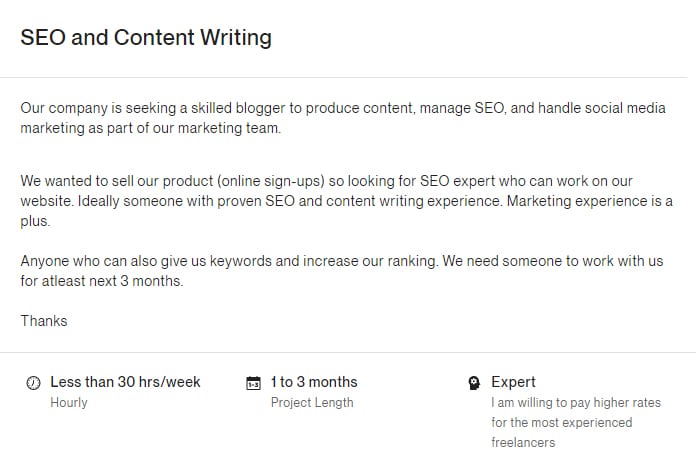
Your goal is to narrow down your potential candidate pool via self-selection. People who are not confident with the meta data, SEO, and marketing aspects will likely not apply to the second example but would feel comfortable with the first.
Remember, as well, that this is your introduction. This is the first thing that a potential writer sees other than the title of the post, so you need to make a good first impression.
Note: You may also want to make it clear what type of position this will be. Specifically, is it a single short-term project, a long-term ongoing relationship, or something in between? This can be a critical detail for a writer to know before they apply.
Consider what you want your freelance writer to do for your company. What will their responsibilities be? For example, you might list things like:
Then, if you're asking them to handle more of your marketing, you may also include items such as:
One thing to keep in mind here is that you may want to avoid "responsibilities" that should be considered a basic level of skill or expected performance from any writer. For example, "proofreading your own content" and "maintaining originality" should not necessarily be job requirements because they are core aspects of the industry. Anyone submitting sub-par content or copied/plagiarized content should expect to be in violation of their contract, not just not doing all of their responsibilities.
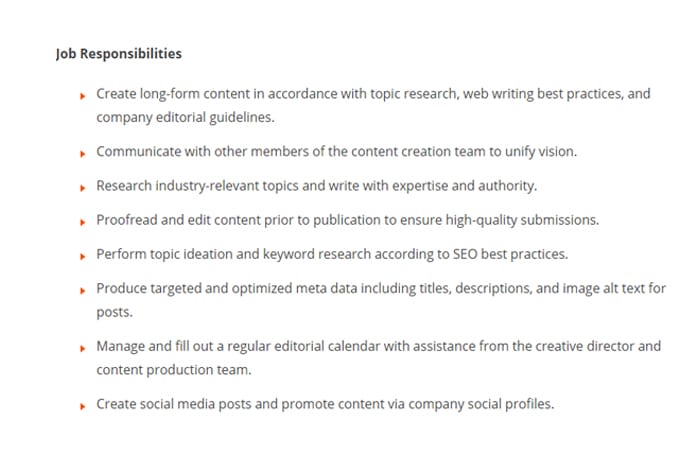
Another example, from BetterTeam, is "submitting your own tax returns in a timely manner." It's not a job responsibility to file your taxes, and no freelance writer worth their salt needs the reminder. This should be left off of job descriptions, despite its presence in the BetterTeam template.
It's usually a good idea to carefully consider everything that your freelancer will be doing and write those responsibilities as they are core to the job. Also, avoid "other duties as required," which is usually a red flag for scope creep and uncompensated additional work.
Much like your list of responsibilities, your list of requirements needs to be carefully crafted. There are three primary tips you should keep in mind.
Let's look at each of these a little closer.
 First, any requirement that should be considered expected just makes your company look like you don't know what you're looking for. For example, listing "familiarity with word processing software," "own a computer or laptop," or "strong communications skills" should not be listed as requirements. Sure, your writers will need all of those things, but no one who considers themselves a professional writer and is applying to jobs online is going to not have those things. It's like hiring for a role as a delivery driver and stating that the applicant must know how to drive. No one who applies to such a role will fail to meet that requirement.
First, any requirement that should be considered expected just makes your company look like you don't know what you're looking for. For example, listing "familiarity with word processing software," "own a computer or laptop," or "strong communications skills" should not be listed as requirements. Sure, your writers will need all of those things, but no one who considers themselves a professional writer and is applying to jobs online is going to not have those things. It's like hiring for a role as a delivery driver and stating that the applicant must know how to drive. No one who applies to such a role will fail to meet that requirement.
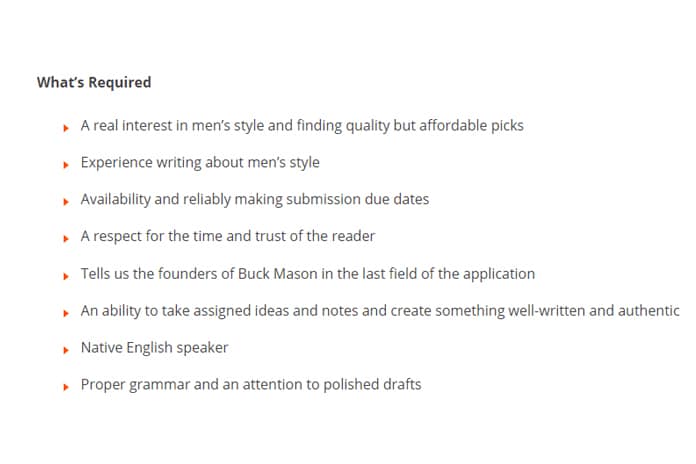
 Second, any requirement that isn't 100% necessary should either be removed or added to a "preferred qualifications" list. For one thing, lengthy lists of unnecessary requirements are suppressive of certain categories of applicants and can, in extreme cases, even be considered discriminatory.
Second, any requirement that isn't 100% necessary should either be removed or added to a "preferred qualifications" list. For one thing, lengthy lists of unnecessary requirements are suppressive of certain categories of applicants and can, in extreme cases, even be considered discriminatory.
One big example is requiring a Bachelor's or higher degree in writing/journalism/communication. Thousands of high-quality freelance writers never went to school for writing, so you'd be eliminating many excellent candidates for no reason.
The third tip relates to things like familiarity with your CMS or with your industry. They may be nice to have, but you can train a writer to learn them quite quickly.
Your company overview shouldn't take center stage, which is why it comes in later in the job description. It's important enough that it needs to be there, but anyone looking seriously at applying with you will likely do their own research into you elsewhere. So, do two things.
First, write a compelling company profile. Second, provide links or resources for further reading, such as to your LinkedIn profile, your Glassdoor profile, or your Careers page.
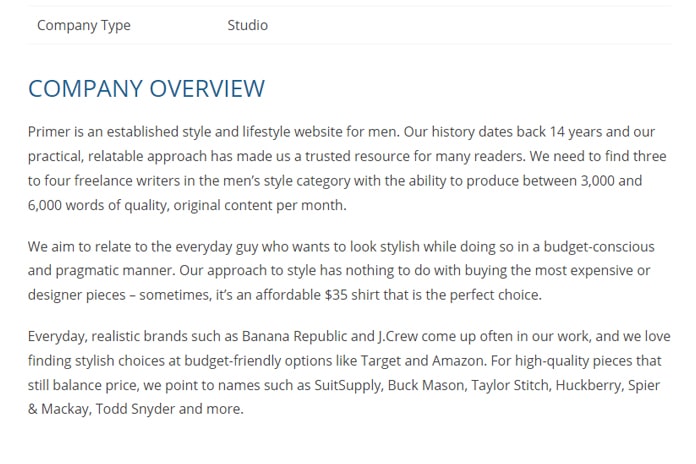
Your company profile should be 2-3 paragraphs that go over the answers to questions your writers will have, such as:
By "contentious space," we mean positions where opinions can run hot. For example, a blog in the health space may dislike traditional medicine, or it may distrust modern medicine and prefer promoting alternatives. A finance site might promote cryptocurrencies, or it might not. And, of course, any politicized issue can be very contentious. This can be important to discuss because you don't want to hire a writer who holds opinions counter to your own and will have a hard time writing for your perspective.
Cultural attributes can be things like embracing a fully remote company culture. It's important to avoid focusing on aspects of culture the writer won't see; it doesn't matter if your break room has a pool table and a snack bar if they're a remote worker who will never see it, for example.
Freelance writers often expect a rather casual application experience, usually revolving around sending an email with a link or a few samples of their work to be reviewed. After that, if they are selected, they will likely be asked to write a test piece or two, which should be paid. Then, they will either be hired/contracted or not.
That said, different companies hiring for different kinds of roles will have different requirements. You want to make it clear what type of position this will be – W2 versus 1099, short term versus long term – as well as what steps the writer will need to take to apply. Provide relevant links, email addresses, and instructions.
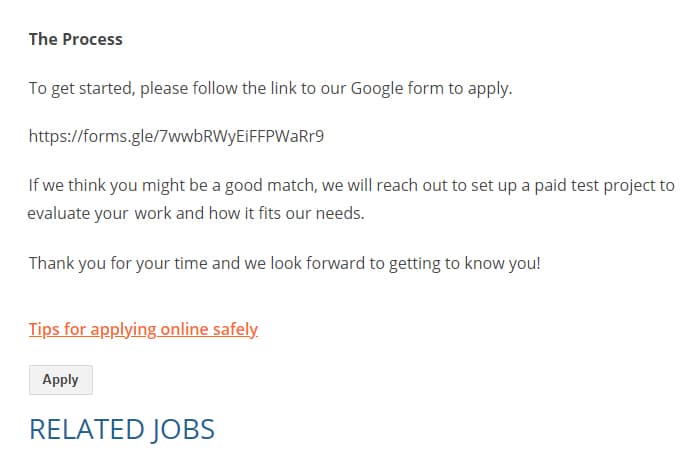
Be sure to know about the sites you're using to post your job ad. Some sites will restrict the links you can include in your job ads, and some prefer to have you use their system for applications. This isn't always very useful for a freelancer or writer hiring process since they tend to be geared towards traditional employees.
Additionally, you can always go to freelance writer hubs or content mills and hire writers directly through those platforms. If you do, make sure you know the rules about contacting writers outside of the platform. Some are both very strict and very aggressive in defending their status as the middleman, so trying to work with a writer you find on one of those platforms, outside of the platform, can open you up to liability.
Freelance writers, moreso than many other professions, live and die by the project. They want to know critical information about your role, potentially even before they apply for it.
The pay rate is a big one. Are you paying per word, per project, or per hour? What is your rate? What are your expectations for revisions and additional duties like meta data, marketing, or other aspects of the job that don't translate nicely into a per-word rate? And, of course, if you're hiring as an actual employee with a W2, what will the salary range be?
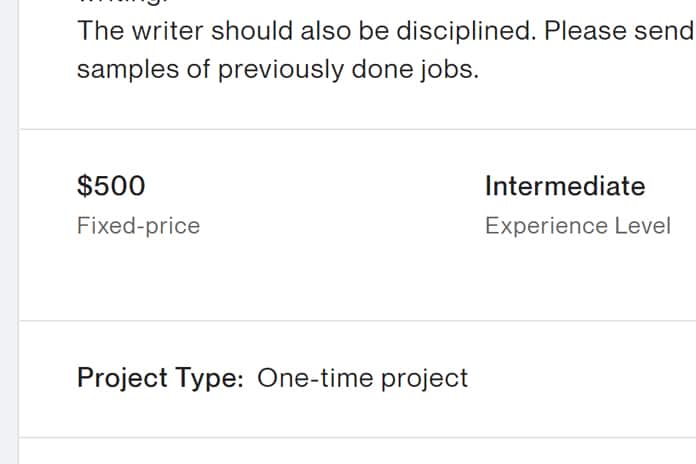
Benefits may or may not be applicable. Freelancers generally don't expect company benefits and have to pay for their own healthcare and retirement, but if you offer any sort of additional benefits to freelancers (even if they have to vest into them), you may want to promote them. Alternatively, be careful about promoting "benefits" like flexible hours for a freelance position because, by definition, when you're hiring a freelancer, they have that flexibility.
Growth opportunities are a big one for temp-to-ongoing relationships. For example, if you're hiring a writer for a short-term project with the option to potentially convert into a regular contributor, that can be a huge incentive for some writers who really want the stability of an ongoing relationship. Likewise, if you offer an introductory pay rate but can raise the rates after the writer proves themselves, providing both a timeline for that raise and an idea of how much it would be can be very attractive.
All of the above might sound like a lot of complex detail, but it's really simple once you get right down to it. Just be honest about your company, your expectations, and your requirements, and avoid falling into the trap of using the same template everyone else does since those templates are packed with nonsense you don't actually need.

Just be reasonable, give it some thought, and write something aimed at attracting the kinds of writers you want to work with, and you'll be good to go.
Are you currently in the process of writing a job description for a freelance writer position? Is there any particular section that you are having struggles with? If so, which one is it? Did today's guide perhaps assist you with that struggle? Be sure to share all your thoughts and comments down below! I'd love to hear what you think, and would be more than happy to assist you however I can, if needed!
We encourage you to share this article on Twitter and Facebook. Just click those two links - you'll see why.
It's important to share the news to spread the truth. Most people won't.